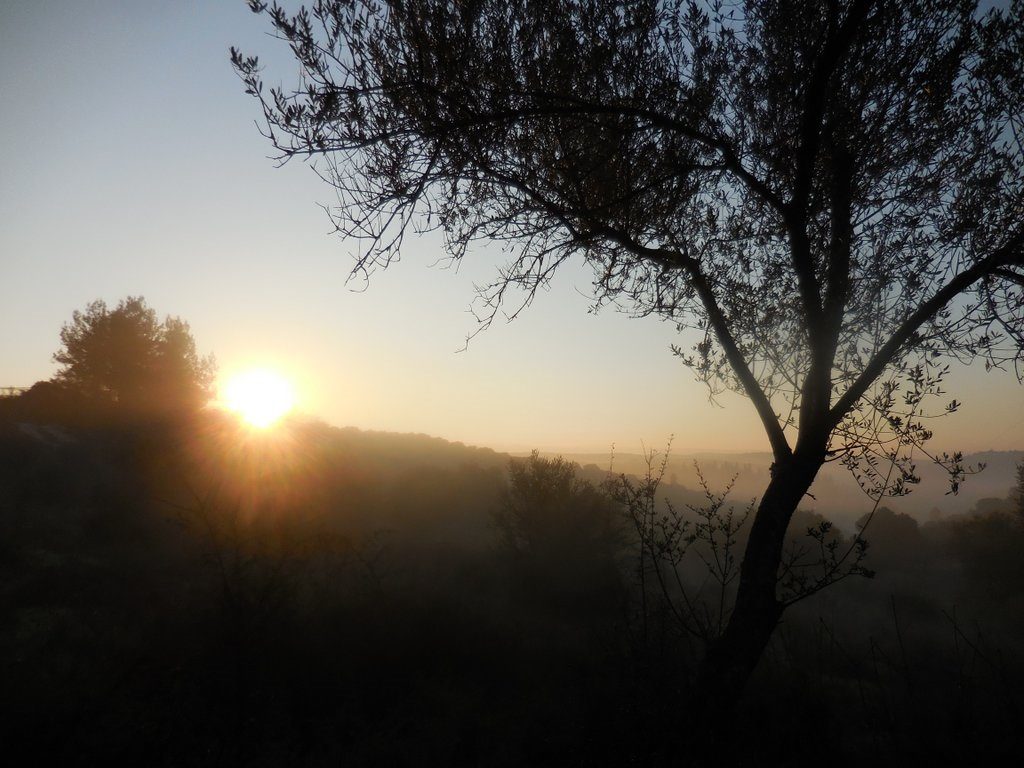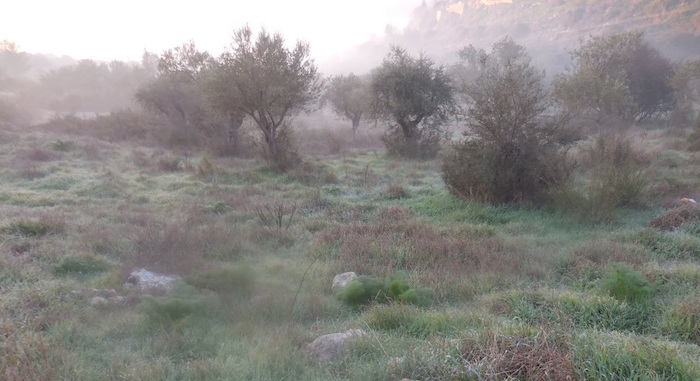By Joanna Chen
The last time I drove up this hill on the outskirts of Jerusalem was just over five years ago. In front of me was an Israeli army truck with six beautiful olive trees strapped to it, their trucks thick and gnarled, the dull leaves trembling as the truck lurched up the hill in heavy traffic. I could not take my eyes off those trees, which must have been 60 years old at least. They were not chopped up, but whole and beautiful and vibrant. From where had they been ripped up so meticulously, and where they being taken to so carefully, I wondered.
For a few minutes the memory of the olive trees took my mind off my dying mother, waiting for me in the hospital facility at the top of the hill. She had been diagnosed barely a month earlier with ALS and the disease had rapidly progressed throughout her body. By now, my mother could no longer walk, her right hand barely worked, and her left hand was beginning to go. The week before, a lawyer came around and gave my mother a living will to sign, so that she would not be intubated or her life prolonged when the time came. She signed the papers with her left hand, a thin scrawl petering off on a white page.

We were taking her home that week, snatching her away from the hospital because, ironically, I was afraid she would die there if she stayed any longer. She was going to die, we had been told this, but I promised myself she would not die there, in a facility that smelled of disinfectant and urine, where once or twice a week someone sitting at my mother’s breakfast table would not be wheeled in anymore. It was not a hospice but an intensive care facility that treats the chronically ill.
The first woman to die after my mother arrived there was a Dutch woman with a smooth, pale face. The evening we brought our mother there, she was sitting out in her wheelchair on the tarmac at the hospital entrance, as if she were waiting on a runway for a flight to somewhere else. She turned to me and smiled, and that smile lit up her whole face. The next day, I popped my head around the door of her room to say hello, and she had gone, the bed empty, the curtains opened wide and the window open.
We got used to this, and after a couple of weeks we stopped asking. If someone did not appear for breakfast, if someone was not wheeled in for lunch, we said nothing and got on with the job of keeping my mother alive.
Passover came and we gathered the whole family for the traditional seder meal, along with an American man and his wife. We sat in the chilly hallway, picking at chicken soup and rice and apple cake in tin foil containers, laughing together as if we had all the time in the world. We did not. I don’t remember the man’s name, only that he was my mother’s friend there because, like her, he spoke English; they had a few laughs together. A week later he died and we shifted the chairs around the table and said nothing.
I drive up the hill. To my right, Mount Scopus; to my left, a road that leads on to the Dead Sea and another leading to Ramallah. In an hour I need to pick up my partner from The Hebrew University, where he works. People are rushing home from work carrying plastic bags and umbrellas against the rain that has begun to fall. Life goes on. On a whim, I continue around the circle and drive back along the road leading to the hospital. I stop outside a small café I used to take my mother to when she was well enough. I would push her up the hill in her massive wheelchair, maneuvering the sidewalk, the bumps in the road, the pedestrian crossing. I grew used to the stares and in fact I didn’t blame people for staring at us; the wheelchair was so unwieldly, so monstrous, and my mother’s face was so pale and pained. But we were just a mother and daughter out on an afternoon walk, off to have a coffee my mother could no longer swallow in a cup she could no longer hold.

I revisit the café. I want to recreate the time my mother and I spent together those last weeks, but the café has changed hands, now run by a young Jewish guy with a black yarmulke on his head. The waiter is an Arab student called Mario from the Galilee. There’s a splattering of Hebrew, a splattering of Arabic and a cheerful, warm atmosphere as I sit down at a corner table. They serve patush here, and kubbe soup, and borekas filled with cheese, a mishmash of Palestinian and Israeli delicacies. An island of cooperation on a hill that has known severe wars through the years.
I think back to those olive trees and I wonder whose garden they are growing in now, and whose grove they were removed from. “If the olive trees knew the hands that planted them, their oil would become tears,” Palestinian poet Mahmoud Darwish once said. For this reason I don’t just imagine the physicality of it, the actual grove, but the people who lovingly tended the olive trees until they were uprooted. I wonder who continues to cultivate them now. Was the army taking them from Arab-owned property to Jewish settlements on the road leading down to the Dead Sea? Maybe. I do a quick Google search and discover that there were many groves uprooted around that time, but mostly the trees were hacked, left to die. At the time, I was still working as a reporter for Newsweek and my inclination was to follow that truck up the hill, to follow those captured olive trees to their new destination. But my mother awaited me, and I turned right at the top of the hill and the truck continued straight up the hill.
I think about my own roots, arriving in Israel at age 16, uprooted by my parents and sent alone to a land that seemed to be just about the most unpromising place I could think of. More than ever, my thoughts dwell on the increasing number of refugees who have no choice but to leave, yet have no place to go. Borders continue to close, including those surrounding the US. Trump’s recent clamp on refugees is a shattering blow to this.
I think, too, about this café, now decorated in wooden panels, a red painted stripe running across the far wall, cream walls above. I look at the woman sitting opposite my table, reading the Jerusalem Post, drinking a cup of coffee, a thick slice of cheesecake with cherries on a plate on the table. She drinks her coffee slowly, she savors the cheesecake. I am glad for her, and when she looks up at me, I smile hesitatingly and she smiles back, surprised at this unexpected acknowledgement of her existence. She wears a soft burgundy-colored hat on her head with a thin ribbon, a paisley scarf around her neck in red and gold. She finishes her cake, folds her newspaper, stands up, counts out her money carefully with shaking hands. A white dog comes up to her and she bends down and strokes it. The dog’s owner apologizes in Hebrew, and then in English. “I want to pay,” she says, and he calls out in Hebrew and Arabic, “The check for table number one, please.”
I was afraid my mother would become so firmly rooted in that hideous facility we would never get her out of there. Perhaps it would have been easier to leave her, where the staff lifted her in and out of bed, on and off the toilet, wheeled her into the dining hall and back out, even though she could no longer eat independently.
But roots can always be taken out of the soil, however deep, and we pulled her out, we signed papers saying we knew the severity of her illness and we took it upon ourselves to care for her. We understood that places fill up quickly here and if we changed our mind and found it too difficult, there probably wouldn’t be room for her. And we did find it too difficult, and she did die, and I wonder, here in the café five years later, where those olive trees are growing today.


